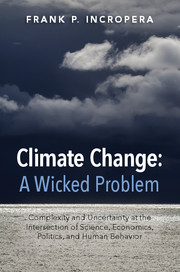 Climate Change: A Wicked Problem
Climate Change: A Wicked Problem Published online by Cambridge University Press: 05 October 2015
The Earth's climate system depends on many factors, and until the nineteenth century all of them were natural. But over the last two centuries exponential growth in human population and consumption has introduced an anthropogenic factor. How significant are anthropogenic effects? Can they alter the natural system, and if so, in what ways? To address these questions, we will consider the physical origins of climate change in Chapters 2 through 4. If you find some of the material challenging, please bear with me. It is fundamentally important to understanding the essence of the problem. Let's first clarify some terms.
Weather and climate
Although there is overlap at the margins, there is a difference between what is meant by weather and climate. Weather characterizes our immediate environment in terms of atmospheric conditions such as temperature, wind speed, cloud cover, and precipitation. As we commonly use it, the word describes conditions at the locale in which we reside or to which we are going and the time we are or will be there. At any locale, weather can vary significantly over small (hourly) time changes, as well as from one season to another. In contrast, climate represents long-term averages of atmospheric conditions for a particular region.
We can describe in general terms winter and summer climates of regions such as the American Southwest and Northeast, Siberia, and sub-Saharan Africa. The climate of any region can also experience statistically significant variations, but unlike weather, changes to climate have historically occurred over much longer time frames, commonly measured in millennia. It is in reference to such variations that we use the term climate change. Another way to frame the distinction is to view weather as more variable over much smaller time scales.
It is tempting to draw conclusions about climate change from local weather patterns, particularly if they involve extreme weather events. The temptation should be resisted. Of course, climate change affects weather. But it can be misleading to draw conclusions about climate change from recent weather as, for example, last winter's conditions in South Bend, Indiana, or last summer's weather in Moscow, Russia. If climate change is inferred from changing weather patterns, the patterns should be examined globally and over an extended (decadal or longer) time frame.
To save this book to your Kindle, first ensure [email protected] is added to your Approved Personal Document E-mail List under your Personal Document Settings on the Manage Your Content and Devices page of your Amazon account. Then enter the ‘name’ part of your Kindle email address below. Find out more about saving to your Kindle.
Note you can select to save to either the @free.kindle.com or @kindle.com variations. ‘@free.kindle.com’ emails are free but can only be saved to your device when it is connected to wi-fi. ‘@kindle.com’ emails can be delivered even when you are not connected to wi-fi, but note that service fees apply.
Find out more about the Kindle Personal Document Service.
To save content items to your account, please confirm that you agree to abide by our usage policies. If this is the first time you use this feature, you will be asked to authorise Cambridge Core to connect with your account. Find out more about saving content to Dropbox.
To save content items to your account, please confirm that you agree to abide by our usage policies. If this is the first time you use this feature, you will be asked to authorise Cambridge Core to connect with your account. Find out more about saving content to Google Drive.